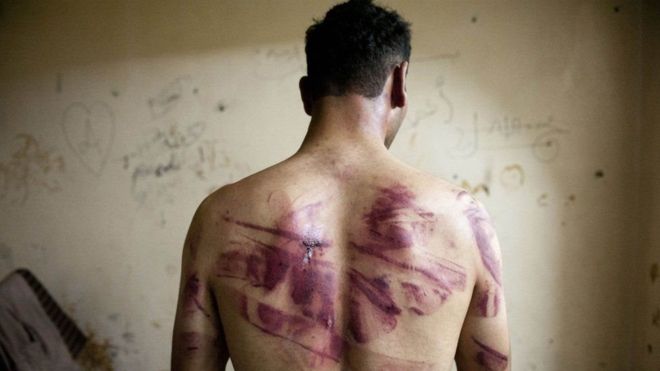الاستمرار في رفع هذه الدعاوى، سيقلّص من الملاذات الآمنة التي يفكر المجرمون باللجوء إليها، والتأكيد على انه لا مفرّ من محاسبتهم ومعاقبتهم مهما طال الزمن
18 / تشرين ثاني / نوفمبر / 2019

المصدر: بروكار برس – ميشيل شماس
بعيداً عن همروجة اجتماعات اللجنة الدستورية في جنيف، تقدم اليوم 12 نوفمبر 2019 خمسة من ضحايا التعذيب في سجون وزنازين الأسد بادعاء جنائي ضد 17 مسؤولاً في أجهزة الأسد الأمنية إلى مكتب الادعاء ووحدة التحقيق بالجرائم ضد الإنسانية وجرائم الحرب في العاصمة النرويجية أوسلو.
وبهذه الدعوى تكون النرويج قد انضمت إلى كل من ألمانيا والنمسا والسويد بفتح أبواب محاكمها أمام قبول شكاوى ضد مرتكبي جرائم الحرب وضد الإنسانية في سوريا. علماً أن عدد الدول الأوربية التي تسمح قوانينها بملاحقة مرتكبي جرائم الحرب وضد الإنسانية وفقاً لمبدأ الاختصاص العالمي هي أربع دول فقط (ألمانيا، النمسا، السويد النرويج).
أول دعوى أقيمت كانت في ألمانيا، بتاريخ 2 آذار 2017، حيث تقدم 9 مدعين من بينهم المحاميان أنور البني ومنعم هيلانة والصحفي مازن درويش بادعاء إلى المدعي العام الألماني بحق عدد من المسؤولين الأمنيين في أجهزة الأمن السورية، وفي حزيران 2018 أصدر المدعي العام الألماني مذكرة توقيف بحق اللواء جميل حسن مدير إدارة المخابرات الجوية في سورية قبل أن يتم إعفاؤه من منصبه، واتهم بإعطاء الأوامر لمرؤوسيه بتعذيب المعتقلين حتى الموت، وقد شكل صدور تلك المذكرة “نقطة انعطاف وخطوة مهمة لصالح المتضررين من منظومة تعذيب الأسد، ولصالح الناجين وعائلات الضحايا وللمعتقلين الذين ما زالوا قابعين في مراكز اعتقال الحكومة السورية “،على حد تعبير فولفغانغ كاليك، الأمين العام لمنظمة المركز الأوروبي لحقوق الإنسان الدستورية European Centre for Constitutional and Human Right.
وفي السادس من تشرين الأول/ نوفمبر 2017، جرى تقديم شكوَتين جديدتين في ألمانيا، بتهم ارتكاب جرائم ضدّ الإنسانية وجرائم حرب، بما في ذلك التعذيب والإعدام الجماعي في سورية. حيث قام 15 لاجئًا سوريًا (رجالًا ونساءً) بتقديم شكوتين، بخصوص أعمال التعذيب المرتكبة في السجون السورية والفروع الأمنية.
وفي 27 أيار ٢٠١٨ تم تقديم أول ادعاء إلى المدعي العام في النمسا ضد ٢٤ من ضباط الأمن في الأجهزة الأمنية السورية بتهمة ارتكاب جرائم ضد الإنسانية والاعتقال التعسفي والتعذيب والإخفاء القسري والقتل في مراكز الاحتجاز، وفي 5/8/ 2019 استمع المدعي العام إلى الضحايا والمدعيين في خطوة تعبر عن قبول النظر بالادعاء وبدء التحقيقات الرسمية فيه.
وفي 19 شباط 2019 قُدمت أول دعوى في السويد من قبل عدد من الناجين من الاعتقال إلى المدعى العام في السويد، وفي 16 أيار 2019 استمع المدعي العام الى شهادات المدعين في الدعوى المقدمة ضد مسؤولين في أجهزة الأمن السورية، وقد علق أحد المدعين بعد الاستماع لشهادته: “من المهم للغاية بالنسبة لي أن أشعر أن السلطات السويدية تهتم بألمنا وتساعدنا في تحقيق العدالة”. وقال آخر: “عندما يتم السعي لتحقيق العدالة، لا تضيع. والآن لدينا سبب للتفاؤل، لدينا القوة للمضي قدمًا في هذه الرحلة الطويلة جدًا”.
وحالياً تُبذل جهود كبيرة لحث الدول الأوربية الأخرى على ضرورة تعديل قوانينها وفتح الباب أمام محاكمها لملاحقة مرتبكي الانتهاكات الخطيرة وجرائم الحرب وضد الإنسانية استناداً لمبدأ الصلاحية العالمية، رغم اقتناعنا بأنّ العدالة للسوريين لن تتحقق في محاكم أجنبية بعيداً عن سوريا،
لكن الاستمرار في رفع هذه الدعاوى، سيقلّص من الملاذات الآمنة التي يفكر المجرمون باللجوء إليها، والتأكيد على انه لا مفرّ من محاسبتهم ومعاقبتهم مهما طال الزمن.. كما إنها تعطي جرعة أمل مهمة بالنسبة للضحايا وذويهم بألا يفقدوا الأمل في تحقيق العدالة طالما أن هناك سوريين يواصلون جهودهم في سبيل ملاحقة المجرمين ومحاكمتهم وإبقاء باب العدالة مفتوحاً.
إن أهمية تحقيق العدالة في سوريا وإدانة الجرائم والانتهاكات الخطيرة في سوريا ومحاسبة مرتكبيها باتت مطلباً مهماً وملحاً ليس من أجل تأكيد سيادة القانون والمحاسبة ورد المظالم إلى أهلها وتعويض الضحايا وطمأنة ذويهم وحسب، بل من أجل وضع حد للأحقاد واليأس والإحباط والاحتقان والتطرف والعنف ومنع حدوث حالات انتقام عشوائية قد تدمر ما تبقى من روابط المجتمع السوري، وأيضاً من أجل إرساء حركة السلم الأهلي والتحوّل نحو مجتمع آمن وقادر على إرساء الديمقراطية.
إن حجم المأساة التي يعانيها الشعب السوري التي لم يشهد لها التاريخ مثيلاً سواء من حيث العدد الهائل لأعداد الضحايا والمهجرين والمختفين قسرياً في سجون النظام، أم من حيث حجم الدمار الهائل والنهب الواسع الذي طال البشر والحجر.. تقتضي منّا جميعاً العمل على تحقيق العدالة والمحاسبة.
-
جميع الدعاوي أقيمت بدعم ومشاركة المركز الأوروبي لحقوق الإنسان الدستورية ولجنة هلسنكي النرويجية والمركز السوري للدراسات والأبحاث القانونية ومجموعة قيصر والمركز السوري للإعلام وحرية التعبير.

 Eng
Eng